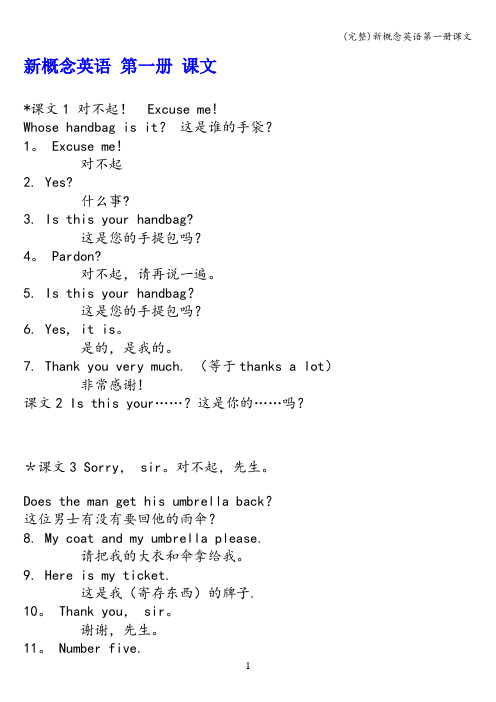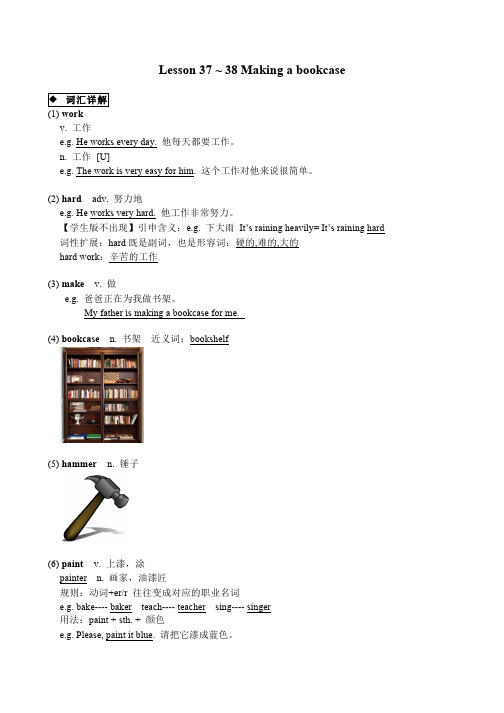新概念英语第一册37-38课
(完整)新概念英语第一册课文

新概念英语第一册课文*课文1 对不起! Excuse me!Whose handbag is it?这是谁的手袋?1。
Excuse me!对不起2. Yes?什么事?3. Is this your handbag?这是您的手提包吗?4。
Pardon?对不起,请再说一遍。
5. Is this your handbag?这是您的手提包吗?6. Yes, it is。
是的,是我的。
7. Thank you very much. (等于thanks a lot)非常感谢!课文2 Is this your……?这是你的……吗?*课文3 Sorry, sir。
对不起,先生。
Does the man get his umbrella back?这位男士有没有要回他的雨伞?8. My coat and my umbrella please.请把我的大衣和伞拿给我。
9. Here is my ticket.这是我(寄存东西)的牌子.10。
Thank you, sir。
谢谢,先生。
11。
Number five.是5号。
12。
Here’s your umbrella and your coat。
这是您的伞和大衣13. This is not my umbrella。
这不是我的伞。
14。
Sorry, sir.对不起,先生.15. Is this your umbrella?这把伞是您的吗?16. No, it isn't.不,不是!17. Is this it?这把是吗?18. Yes, it is。
是,是这把19。
Thank you very much.非常感谢。
*课文4 Is this your……?这是你的……吗?*课文5 Nice to meet you。
很高兴见到你。
Is Chang-woo Chinese ?昌宇是中国人吗?20. Good morning.早上好。
21。
Good morning, Mr. Blake。
新概念英语lesson37-38(共52页)课件

• 两个词用作名词,都有“工作”的意思。 但两者的用法却有差别。
• work作名词时,常指抽象意义上的工作, 是不可数名词,无复数形式,如不能说a work, “一份工作”要说a piece of work
• job作名词时,常指某项具体的工作,是可 数名词,有复数形式。
• hard • (1)adv.努力地 • 副词常后置修饰动词,或形容词后修饰 • 努力地工作 • work hard 努力地工作 • study hard 努力地学习 • (2)adj. 辛苦的,困难的,坚硬的,努力的
她正在化妆。
bookcase [´bʊk- keɪs] n.书橱,书架
bookshelf:书架 bookshop/ bookstore:书店 bookseller:书商 bookmark:书签 bookworm:书虫、书呆子
• hammer
paint [peɪnt] v.上漆,涂
• v. 上漆,涂 • paint the wall white 把墙涂成白色 • n. 油漆;涂料;颜料 • Wet Paint! 油漆未干!
favourite [´feɪvərɪt] adj.最喜欢的
Lesson 37 New words
• ★work • (1) v. 工作 • I work for… • 我为…工作。 • ★ work • (2)n. 工作 • go to work 去上班 • job n. 任何有报酬的工作(可数名词)
favourite adj. 最喜欢的
e.g. This is my favourite CD. 这是我最喜欢的CD。
--Am I your favourite student? 我是你最喜欢的学生吗?
-- Yes, you are. -- No, you are not!
新概念英语第一册L37~38

Lesson 37 ~ 38 Making a bookcaseu 词汇详解(1) workv. 工作e.g. He works every day. 他每天都要工作。
n. 工作[U]e.g. The work is very easy for him. 这个工作对他来说很简单。
(2) hard adv. 努力地e.g. He works very hard. 他工作非常努力。
【学生版不出现】引申含义:e.g. 下大雨It’s raining heavily= It’s raining hard 词性扩展:hard既是副词,也是形容词:硬的,难的,大的hard work:辛苦的工作(3) make v. 做e.g. 爸爸正在为我做书架。
My father is making a bookcase for me.(4) bookcase n. 书架近义词:bookshelf(5) hammer n. 锤子(6) paint v. 上漆,涂painter n. 画家,油漆匠规则:动词+er/r 往往变成对应的职业名词e.g. bake---- baker teach---- teacher sing---- singer用法:paint + sth. + 颜色e.g. Please, paint it blue. 请把它漆成蓝色。
(7) pink adj. 粉色的;n. 粉色pink shirt 粉红色衬衫(8) favourite adj. 最喜欢的e.g. 粉色是我最喜欢的颜色。
Pink is my favourite colour.(9) homework n. 作业[U]do one’s homework做作业e.g. 我们每天都做家庭作业。
We do our homework everyday.辨析:housework家务活(10) listen v. 听用法:listen to…e.g. 听音乐listen to music 听老师listen to the teacher(11) dish n. 盘子,碟子搭配:wash the dishes洗碗dish还可表示菜:main dish 主菜u◆重点语法(1) 一般将来时Il●be going to句型表示:打算要做某事或即将要发生某事l●规则:to 后接动词原形be 根据人称的变化而采用不同的形式:am , is , aree.g. 他打算去看一部电影。
新概念一37-38练习详解

Lesson37—Lesson38二、从下面A、B、C三个选项中选出正确的答案,并把正确的字母编号写在括号里。
( A ) 1. He always works very ___.A. hardB. hardlyC. hardworking详解:他工作总是很努力。
A.Hard副词努力修饰动词工作。
B. hardly 几乎不。
C. hardworking 勤奋的,形容词( B ) 2. —Listen! Who ___ that piano?—My sister.A. playsB. is playingC. is to play详解:听,谁正在弹钢琴。
我的姐姐正在进行时态。
( B ) 3. —You’ve left the light on.—Oh, sorry. ___ to turn it off.A. I’ve goneB. I’m goingC. I go详解:你一直让等开着。
哦,对不起,我正打算去关灯。
Be going to do 正准备做某事。
( C ) 4. —Jim, can you help me to wash the dishes?—Sorry, dad. I ___ to the shop.A. goB. have beenC. am going详解:吉米,你能帮助我洗我的盘子吗?对不起,爸爸我正准备去商店。
( C ) 5. ___ away this dirty shirt and bring me a clean one.A. PickB. BringC. TakeTake awy 拿走,拿开。
拿开我的脏衬衫然后给我拿一件干净的。
( B ) 6. I don’t think ___ rain this afternoon.A. it won’tB. it’s going toC. if it’s going to我不认为今天下午会下雨。
( C ) 7. Wang Ming, my boss, ___ Africa next month.A. visitB. are visitingC. is going to visit王明,我的老板,正打算下个月去拜访非洲。
新概念英语第一册第37-38课-Making a bookcase

新概念英语第一册第37-38课:Making abookcaseLesson 37 Making a bookcase做书架Listen to the tape then answer this question.What is Susans favourite colour?听录音,然后回答问题。
苏珊最喜爱哪种颜色?Youre working hard, George.What are you doing?丹:你干得真辛苦,乔治。
你在干什么呢?Im making a bookcase.乔治:我正在做书架。
Give me that hammer please, Dan.乔治:请把那把锤子拿给我。
丹。
Which hammer.This one?丹:哪一把?是这把吗?No, not that one.The big one.乔治:不,不是那把。
是那把大的。
Here you are.丹:给你。
Thanks, Dan.乔治:感谢。
丹。
What are you going to do now, George?丹:你现在准备干什么,乔治?Im going to paint it.乔治:我准备把它漆一下。
What colour are you going to paint it?丹:你准备把它漆成什么颜色?Im going to paint it pink.乔治:我想漆成粉红色。
Pink!丹:粉红色!This bookcase isnt for me.Its for my daughter, Susan.Pinks her favorite colour.乔治:这个书架不是为我做的,是为我的女儿苏珊做的。
粉红色是她最喜爱的颜色。
New Word and expressions 生词和短语workv. 工作hardadv. 努力地makev. 做bookcasen. 书橱,书架hammern. 锤子paintv. 上漆,涂pinkn. adj. 粉红色favouriteadj. 最喜爱的Notes on the text课文解释1 Youre working hard, George.在这句话中hard是一个副词,修饰动词work,有“努力地”、“费劲地”的意思。
新概念英语第一册-Lesson37-38

What can you see in the picture?
A bookcase
Listening part
Listen and answer these questions:
1. What is George doing? He's making a bookcase. 2. What is George going to do now? He's going to paint the bookcase. 3. Is the bookcase for George? No, it isn't. 4. Is the bookcase for Susan? Yes, it is.
Grammar:
The simple future tense:
①表示将来发生的动作或将来存在的状态;
②be going to(口语),主观推测
will(正式),客观必然发生
Grammar:
The simple future tense: 时间状语:tomorrow in + 一段时间 next week
What is he doing? He is shaving
What is he doing? He is typing
What are they going to do?
They are going to go shopping.
What is she going to do?
What is he doing?
Grammar:
Sentence structures 我明天准备去看电影。 肯定句: 一般疑问句: 肯定回答: 否定回答: 否定句:
新概念英语(一)lesson37-38

the dishes.
• 模仿例句写出相应的对话。 • Example: • Paint this bookcase • ---What are you going to do? • ---I’m going to paint this bookcase. • ---What are you doing now? • ---I’m painting this bookcase.
•
Pink’s her favourite colour.
• 一般将来时态: • 一、概念:
表示将要发生的动作或存在的状态及打算、计划或 准备做某事。句中一般有以下时间状语:tomorrow, next day(week, month, year…),soon, the day after tomorrow(后天)等。 二、基本结构:①be going to + do; ②will+ do. 三、否定句:在be动词(am, is, are)l后加not或情 态动词will后加not成won’t。 例如:I’m going to have a picnic this afternoon.→ I’m not going to have a picnic this afternoon. • 四、一般疑问句: be或will提到句首,some改为any, and改为or,第一二人称互换。 例如:We are going to go on an outing this weekend. → Are you going to go on an outing this weekend?
• 新单词: • 1. homework (n. 名词) 作业 • housework ? • 2. listen (v. 动词) 听 • 3. dish (n. 名词) 盘子,碟子
新概念英语第一册37-38课精品课件

一般将来时: 表示将要发生的事,或打算、计划、决定 要做的事情。
特殊疑问句: 疑问词+be+主语 +going to+动原+其他?
特殊疑问句: 疑问词+be+主语 +going to+动原+其他? 对划线部分提问:
1.I’m going to call you tonight.
2.She is going to get up at 8.
give sb. sth. = give sth. to sb. 把· · · 给某人 请给我们三个热狗。
Please give us three hot dogs.
你能把这件夹克给Tina吗?
Can you give this jacket to Tina?
Text
Thanks, Dan. Here you are.
There is a sofa beside the desk.
There is a picture beside the clock.
There is lamp beside the computer.
There are shoes under the bed. There is a lamp on the bookcase. There is a picture on the wall. There is a cabinet on the right. There are some books on the table.
I'm going to paint it.
What are you going to do now, George?
Text
I'm going to paint it pink.
- 1、下载文档前请自行甄别文档内容的完整性,平台不提供额外的编辑、内容补充、找答案等附加服务。
- 2、"仅部分预览"的文档,不可在线预览部分如存在完整性等问题,可反馈申请退款(可完整预览的文档不适用该条件!)。
- 3、如文档侵犯您的权益,请联系客服反馈,我们会尽快为您处理(人工客服工作时间:9:00-18:30)。
work [wɜ:k] v. 工作 hard [hɑ:d] adv.努力地 make [meɪk] v. 做 bookcase [´bʊk- keɪs] n.书橱,书架 hammer [´hæ mə] n.锤子 paint [peɪnt] v.上漆,涂 pink [pɪŋk] n&adj.粉红色;粉红色的 favourite [´feɪvərɪt] adj.最喜欢的
adv. 努力地,认真地(用于修饰 动词,加强动作强度)
study hard 认真学习 try hard 努力尝试
work hard 努力工作 listen hard 认真听课
hard-working adj.认真的,努力的 She is a hard-working student.
make
Text
This bookcase isn't for me. It's for my daughter,Susan. Pink's her favourite colour.
Pink!
Give sb. sth. = Give sth. to sb. make a bookcase
FOR prep. 给。。。的(后面的代词用宾格)
Work & job
job
只能作名词用,指特定的具体的工作。它 是可数名词。我们可以说a job。
My brother is looking for a new job. (我哥哥 在找一份新工作。) He had many jobs before. (他以前做过很多 种工作。)
hard
She is going to cook a meal. 2.她要做一顿饭。 ‗‗‗‗‗‗‗‗‗‗‗‗‗‗‗‗‗‗‗‗‗‗‗‗ They are going to swim in the river. 3.他们要去江里游泳。‗‗‗‗‗‗‗‗‗‗‗‗‗‗‗‗‗‗‗‗‗‗‗‗‗‗‗‗ 4.你打算把书橱刷成粉色的吗? Are you going to paint the bookcase pink? ‗‗‗‗‗‗‗‗‗‗‗‗‗‗‗‗‗‗‗‗‗‗‗‗‗‗‗‗ ‗‗‗‗‗‗‗‗‗‗‗‗‗‗ Yes, I am. 肯定回答: No, I am not. 否定回答: ‗‗‗‗‗‗‗‗‗‗‗‗‗‗
Text
I'm making a bookcase.
You're working hard, George. What are you doing?
Text
Give me that hammer please,Dan. Which hammer? This one?
No, not that one. The big one.
work 常指抽象意义的工作,是不可 数名词,也可以做动词使用,前面 不能加冠词,也没有复数,说一份 工作,要说a piece of work. Eg. John works in a hospital. Do you want to go shopping after work? (你想下班后去购物吗?)
What is he doing?
He is going to write
He is writing
What is girl going to do?
What is boy doing?
She is going to paint . He is painting
What are you going to do?
vt 制造,做,产生,整理,获得
Eg,
make paper 造纸 make a coat做衣服 make a noise 发出噪音 make the bed铺床 make money 赚钱
paint vt. 涂画,漆
paint sth +颜色
把什么涂成某种颜色
例:She is going to paint her bedroom pink 动词 宾语 宾补 她准备把她的卧室刷成粉色。
work hard
make a bookcase
big hammer
for daughter
paint pink
Lesson 38
What are you going to do? What are you doing now?
What is he doing? He is working
What is baby doing?
Review
1.方位介词复习:
和……在一起 be with 在……上方 on 在……下面 under 沿着 along 在……旁边 beside 从……出来 come out of… 在….上方 over 看一看 look at…
在……之间
between
穿过 across 在右边 on the right 走进…… go into…
1.
2.
3.
4.
我不准备吃午餐了。(have lunch) 她们不打算去逛街了。(go shopping) 他们不打算去爬山了。(climb the hill) 她不准备去关灯了。(turn off the light)
1.
2.
3.
4.
I’m not going to have lunch. They are not going to go shopping. They are not going to climb the hill. She is not going to turn off the light.
变成一般疑问句:
1.I’m going to call you tonight. 2.She is going to get up at 8. 3.They are going to cook dinner. 4.He is going to the bank.
Practice
am going to make a bookcase. 1. 我打算做一个书橱。 I‗‗‗‗‗‗‗‗‗‗‗‗‗‗‗‗‗‗‗‗‗‗‗
There is a sofa beside the desk.
There is a picture beside the clock.
There is lamp beside the computer.
There are shoes under the bed. There is a lamp on the bookcase. There is a picture on the wall. There is a cabinet on the right. There are some books on the table.
Text
Thanks, Dan. Here you are.
I'm going to paint it.
What are you going to do now, George?
Text
I'm going to paint it pink.
What colour are you going to paint it?
The baby is sleeping
What is he doing?
He is shaving
What is he doing? He is typing
What are they going to do?
They are going to go shopping.
What is she going to do?
一.按要求对下列句子进行句型转换 1.He is going to take computer lessons this afternoon. (改为 否定句) He is going to take computer lessons this afternoon. 2.They are going to take a trip in this summer vacation. (变为一般疑问句) Are they going to take computer lessons this afternoon? 3.I am going to do my homework tomorrow? (对画线部分提问) What are you going to do tomorrow?
1.Who
is working hard? 2.What is George doing? 3.Is he making a bookcase? 4.Then what is he going to do? 5.What colour is he going to paint the bookcase?
Now I am shaving.
那本书是给他的。 1. That book is for him.‗‗‗‗‗‗‗‗‗‗‗‗‗‗‗‗‗‗‗‗‗‗‗ 2. The socks are not for her. 那双袜子不是给她的。 ‗‗‗‗‗‗‗‗‗‗‗‗‗‗‗‗‗‗‗‗ Are these letters for me? 3.这些信是我的吗? ‗‗‗‗‗‗‗‗‗‗‗‗‗‗‗‗‗‗‗‗‗‗‗ Yes, they are. 是的,它们是。 ‗‗‗‗‗‗‗‗‗‗‗‗‗‗‗‗‗‗‗‗‗‗‗ It's for my son, Peter. ‗‗‗‗‗‗‗‗‗‗‗‗‗‗‗‗‗‗‗‗‗‗‗‗ 4.它是给我的儿子Peter的。
There is a window in the wall, There is a guitar, beside the window.
The fish is in the river.
She is swimming across the river.
There is a bridge over the river.
